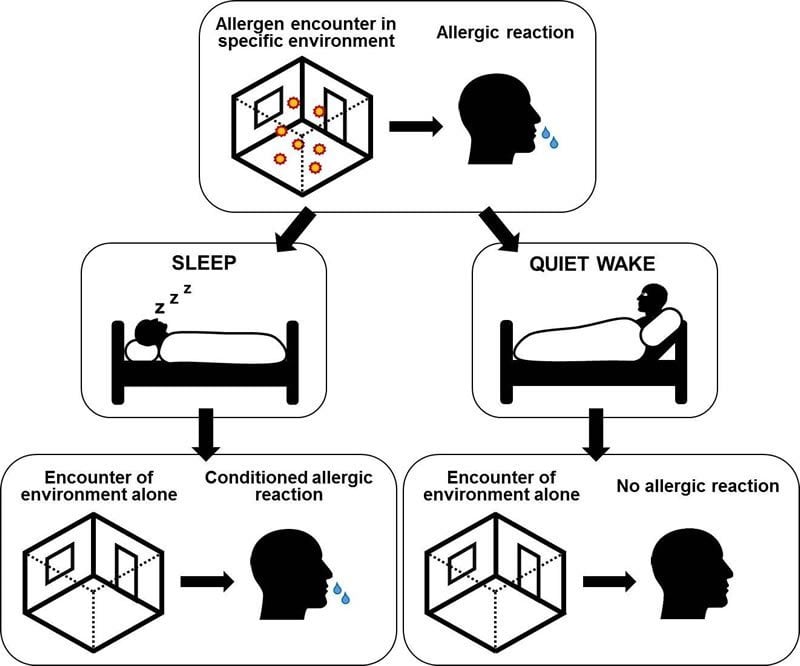Summary: Allergic reactions can be triggered with, or without, exposure to the allergen as the result of a psychologically conditioned reaction. The findings explain why some allergic reactions are observed as a form of placebo reaction when the original allergen is not present.
Source: University of Tubingen
Allergic reactions can occur without being triggered by an allergen such as grass or birch pollen—it is enough for the patient to be back in the same place where she was previously exposed to the allergen, as researchers at the University of Tübingen have found. However, this kind of conditioned reaction to an intrinsically neutral and harmless situation only happens after a sleep phase that follows the conditioning.
The new study on the influence of psychological factors on allergic reactions was led by Dr. Luciana Besedovsky and Professor Jan Born from the Institute of Medical Psychology and Behavioral Neurobiology. The findings go some way toward explaining why allergic reactions are frequently observed as a form of placebo reaction when the original allergen is not present. The study has been published in the latest Proceedings of the National Academy of Sciences.
The research team recruited volunteers with allergic rhinitis, who were then given a nasal spray containing their respective allergens (grass or birch pollen) in a neutral test room. The strength of the allergic reaction occurring in the subjects was measured by the amount of a specific enzyme in the nasal secretion. Half of the subjects went to sleep for eight hours after this experiment, while the other half had to stay awake until the following evening. One week later, the experiment was repeated in the same test room. But this time, no allergens were given.

“The subjects reacted with allergic rhinitis shortly after entering the room—but only those from the group that slept,” says Besedovsky. subjects who remained awake did not have an allergic reaction upon returning to the room in which the experiment was conducted, Besedovsky adds. Nor did members of the group who slept suffer a reaction in another place they were taken to in the second week.
The brain is a fast learner
“Just as in a conventional learning process, the sleep phase played a decisive role in our study. Only through sleep did the brain firmly connect a certain environment with an allergic reaction,” says Jan Born, adding that this is the first experimental proof that a specific location alone can trigger an allergic reaction. The researchers believe that—as in many memory-building processes—the hippocampus plays a role in conditioning the organism to respond to its environment. And the hippocampus functions in a sleep-dependent manner.
“It is astonishing how quickly the immune system learns the mismatched reaction. In the experiment, a single allergen dose was sufficient to link the allergic reaction with the environment,” Besedovsky says. Deciphering this learning mechanism is a boost to research into both allergies and sleep. However, it is hard to draw simple conclusions on how to improve the situation of allergy sufferers. After all, they have to sleep—especially as sleep has a positive effect on other, helpful immune reactions.
About this neuroscience research article
Source:
University of Tubingen
Media Contacts:
Press Office – University of Tubingen
Image Source:
The image is credited to Luciana Besedovsky.
Original Research: Open access
“Human sleep consolidates allergic responses conditioned to the environmental context of an allergen exposure”. by Luciana Besedovsky et al.
PNAS doi:10.1073/pnas.1920564117
Abstract
Human sleep consolidates allergic responses conditioned to the environmental context of an allergen exposure
Allergies are highly prevalent, and allergic responses can be triggered even in the absence of allergens due to Pavlovian conditioning to a specific cue. Here we show in humans suffering from allergic rhinitis that merely reencountering the environmental context in which an allergen was administered a week earlier is sufficient to trigger an allergic response—but only if participants had slept after allergen exposure. This context-conditioning effect was entirely absent when participants stayed awake the night after allergen exposure or were tested in a different context. Unlike in context conditioning, cue conditioning (to an odor stimulus) occurred independently of sleep, a differential pattern that is likewise observed for conditioning in the behavioral domain. Our findings provide evidence that allergic responses can be conditioned to contextual information alone, even after only a single-trial conditioning procedure, and that sleep is necessary to consolidate this rapidly acquired maladaptive response. The results unravel a mechanism that could explain part of the strong psychological impact on allergic responses.
Feel Free To Share This Psychology News.






